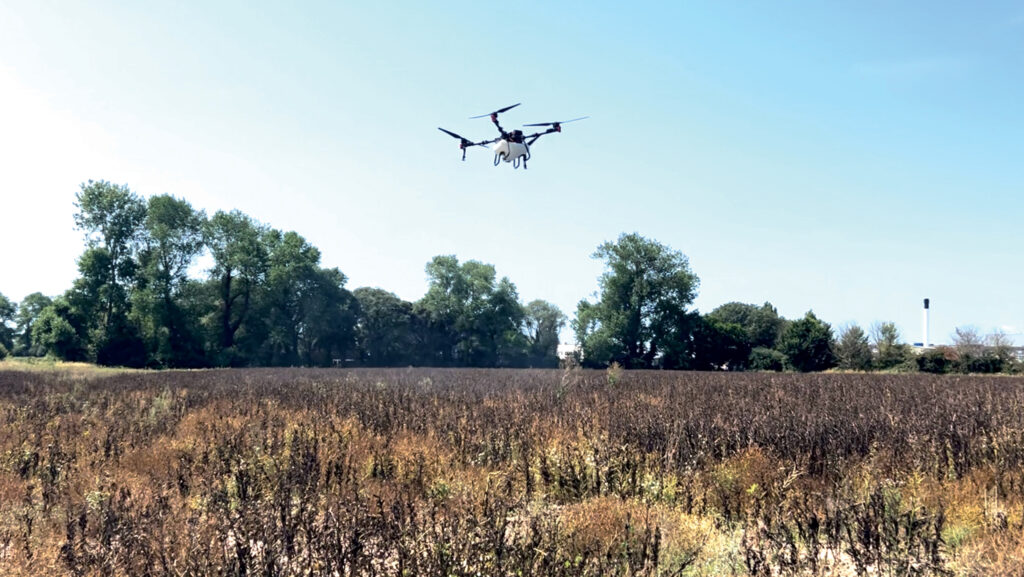Drone applies pod sealant to beans in pioneering UK trial
 © MAG/Lois King
© MAG/Lois King In the first-ever UK trial, pod sealant has been successfully applied to a winter bean crop using a drone ahead of harvest.
Pod sealants are typically applied to crops prior to desiccation to reduce shattering of bean pods which become dry and brittle in the run up to harvest.
See also: Harvest set to finish ahead of schedule at Sussex estate
Richard Cobbald, farm manager at Bartlow Estate and the trial’s host, points out that in particularly dry years he can lose up to 50% of his crop to pod shatter.
Not only does it hit yields, it also increases the number of volunteers appearing in the next crop.
To minimise losses, Richard often uses a pod sealant applied with his conventional sprayer. But he was interested in hosting trials using a drone as an alternative approach.
“I was intrigued to get involved with the trial. As farmers, we’ve got to support companies and give them time to demonstrate to help new technologies in the industry evolve,” says Richard.
The trial
In the trial, the product Pod-Stik was applied to a 5ha area of winter beans by a XAG P100 Pro drone at the estate in Cambridgeshire.
Rob Pearson of AutoSpray Systems, who was involved with the trial, says the drone travels at 27mph, covering 12m per second, flying 3m above the crop.
The Pod-Stik was applied at a rate of 100 litres/ha, with a droplet size of 230-microns to give excellent penetration deep into the crop, ensuring maximum coverage and effectiveness across the whole plant.
“A slick pit-stop system allows for efficient battery swaps and refills, where the drone then automatically resumes from where it left off,” explains Rob.
This means it can cover 20ha in an hour.
Applying the pod sealant with the drone meant there was no physical crop damage, something that can happen when using a conventional sprayer in thick crops.
The drone could be operated regardless of ground conditions, allowing the operator to pinpoint application without tramlines, which will help prevent unnecessary soil compaction.
“The coverage on the bean pod was exceptional, even under the pod,” says Richard.
Practicality
Skylark Precision Drone Solutions demonstrated the drone on a 2ha field in Titch Hill Farm, Sussex.
Graham Moss and Rob Kinnaird, co-founders of the firm, explained that drone technology isn’t trying to replace large-scale machinery, but to offer an alternative service.
“The drones provide a niche service, especially in wet conditions or awkward areas where traditional machinery might struggle,” says Graham.
While drones won’t replace big machinery immediately, their role in precision agriculture is growing fast.
Richard agrees, pointing out that limitations remain for practical large-scale arable work.
Scaling up
AutoSpray Systems now has 50 drone operators across the UK and is scaling up operations. The company is currently working to expand the range of products for which they have regulatory approval, with slug pellets being next in line.

